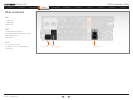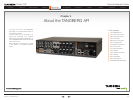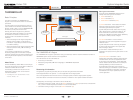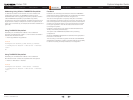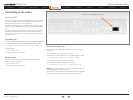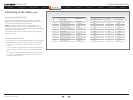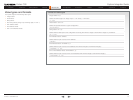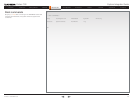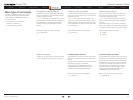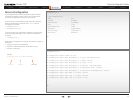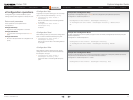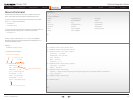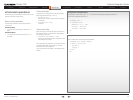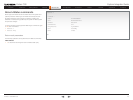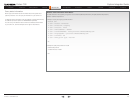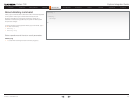
D14128.02—NOVEMBER 2008
39
Codec C90
System Integrator Guide
Contents Introduction Getting Started Interfaces About the API xConfiguration xCommand xStatus Cameras Appendices Contact us
About the API
Main type of commands
The XACLI is divided into three main types of
commands, reflecting the information types
supported by the TANDBERG API Engine.
The main types are:
Configuration type commands•
Status type commands•
Command type commands•
Configuration type commands
Configuration type commands defines the system
settings. Configuration type commands are either
supplied or read by the user.
Example: Set default call rate, baud rate of a serial
port and enabling/disabling of various features etc.
The configuration commands are structured in
a hierarchy, making up a database of system
settings.
Supported Configuration-type commands:
xConfiguration
Command type commands
Command type commands instructs the system to
perform an action. Command type commands are
supplied by the user.
Example: instructing the system to place a call,
assign floor to a specific site, disconnect a call etc.
A Command type command is usually followed by
a set of parameters to specify how the given action
is to be executed.
Supported Command-type commands:
xCommand
Status type commands
Status type commands returns information about
the system and system processes. Status type
commands are read by the user.
Example: Information generated by the system
about ongoing calls, network status, conference
status etc.
All status information is structured in a hierarchy,
making up a database constantly being updated by
the system to reflect system and process changes.
Supported Status-type commands:
xStatus
xHistory
Special commands
In addition to the above sets of commands, XACLI
supports the following set of special commands:
Feedback type command
The xFeedback command is used to specify what
parts of the configuration and status hierarchies to
monitor.
Feedback will only be issued on the RS-232/Telnet/
SSH session for which it is specified.
If connecting to the TANDBERG codec with
multiple RS-232/Telnet/SSH sessions, each
session can define feedback individually.
More on this can be found in xfeedback.
xFeedback
Preferences type command
The xPreferences command is used to set various
preferences for the RS-232/Telnet/SSH sessions.
Each session can define preferences individually.
IMPORTANT! This command has various settings
to define the formatting of the XACLI output. It is
therefore important to define settings to match
the parser used on the control system. XACLI
is designed to make parsing of data from the
TANDBERG Codec C90 very simple.
More on this can be found in xpreferences.
xPreferences



